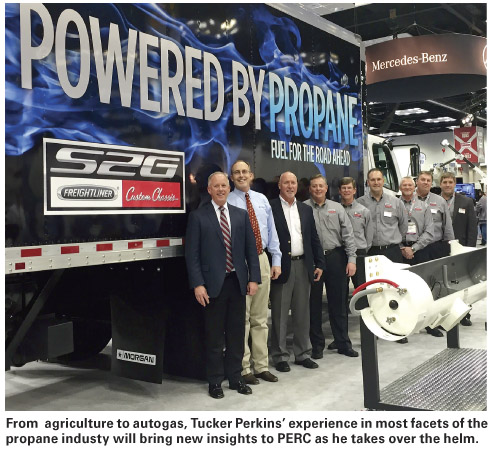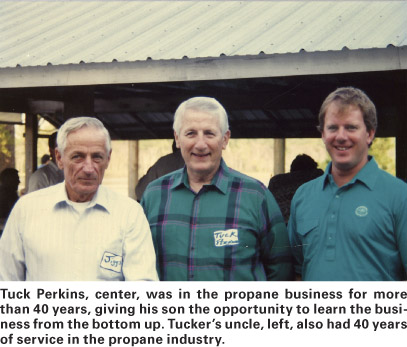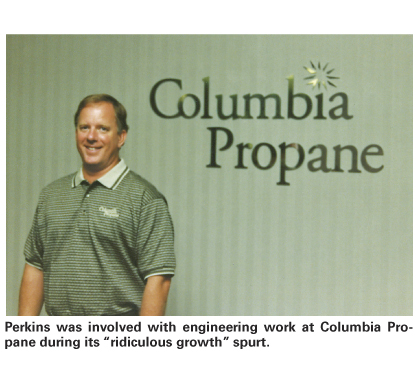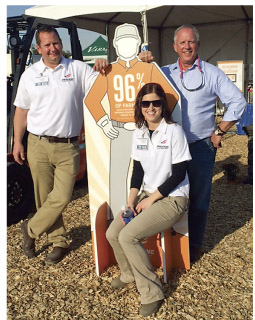Wednesday, July 19, 2017
During his time as chief business development officer at the Propane Education & Research Council (PERC), Tucker Perkins has seen many bright spots, and some not so bright. Perkins, who in May 2017 was named the new president and CEO of PERC, mentioned developing relationships with manufacturers of propane products as one bright spot of his tenure. However, he notes the main highlight of his time with the council is less tangible than specific milestones. 
“One thing I’m most proud of is the start of a cultural shift at PERC to really understand the soul of a marketer, to understand what the pressures are on a marketer,” he stated. “That’s a tall order as you think about how varied that can be. Are you talking about a national MLP [master limited partnership], or are you talking about someone who is only geographically in one city or one town? I think the staff here has begun to at least appreciate what life looks like as a propane marketer and try to create programs that are useful to propane marketers.”
Perkins’ predecessor as president and CEO, Roy Willis, is staying on at the council until July 31, 2017, and Perkins takes over the next day on Aug. 1. He plans to do what he says is not really in his nature: to listen. That means listening to what propane marketers think PERC should do, listening to propane product manufacturers’ ideas about how PERC can be a better partner, and listening to staff members’ opinions on what the council can do better.
“Even though I’ve been here five years, it’s a natural opportunity to just sit back and reflect for a while about how PERC could evolve to be even more effective. So I’m going to do something that’s not my best attribute. I’m going to listen a lot better than I normally would, and listen to a lot of people.”
He also plans to listen to the state propane gas associations and the National Propane Gas Association (NPGA). Perkins wants the council to be “aligned perfectly” with those two entities, and he noted that now is a good time to reassess how to do that. PERC will never operate at its maximum effectiveness if it is not well-aligned with them, he added. They help marketers understand what PERC does and how to use what it promotes.
“I know as a [former] propane marketer myself how valuable it was to go to the Virginia Propane Gas Association meeting and learn about the latest technologies and the latest changes,” said Perkins, who added that he attended many state association meetings when he worked for Inergy Propane and CleanFUEL USA. “You really see some classic organizations at work.”
PERC will continue its work in understanding the soul of a marketer, and Perkins’ experience as a marketer will be helpful in that area. His father, Tuck Perkins, was in the propane business for more than 40 years with Bottled Gas Corp. of Virginia. A natural gas utility owned Bottled Gas Corp., which Perkins described as a large regional propane company. The younger Perkins still believes today that it was one of the best propane companies he has ever seen, especially in the areas of safety, marketing, and operations. He started working with his father at the company at the age of 16, “doing things you can do when you’re 16,” such as delivering cylinders and filling cylinders.

“If anyone wants to talk about how best to scrape and paint a propane tank, I’m probably as well-versed at that as anyone. I worked there all through college. Summers, holidays, and doing service work, and we did a lot of bulk plant design and construction.” He stayed on with the company all through college, getting his engineering degree and then going to work as a consulting engineer.
Soon afterward, another local natural gas company acquired Bottled Gas Co., where his father worked, and Perkins returned to work for that company as a chief engineer. The natural gas company also ran a propane import terminal.
Perkins described that time, from around 1982 to 1988, as a great part of his career. He participated in operating the propane import terminal, and he helped oversee the design and construction of natural gas pipelines and worked on cathodic protection at distribution networks. “It was an exciting time. I loved that work.” But then he finished his master’s degree in business and decided he did not want to work for what he perceived as a big utility company. “I wanted to do something more entrepreneurial.” He went to work as a project manager for a civil construction business, building bridges, interstates, shopping malls, office complexes, and an airport. About two years later, his old propane company in Richmond, Va., which had changed its name to Columbia Propane, came calling. He did engineering work for the company while it started what he called “a ridiculous growth spurt.” Columbia Propane’s acquisition of National Propane was a highlight of Perkins’ career because of the work that went into blending the two company cultures. AmeriGas purchased Columbia in 2001, and Perkins said many Columbia locations that are now AmeriGas are flourishing today and many Columbia Propane employees from back then have strong careers today with AmeriGas.

Perkins could have stayed with AmeriGas. But he decided to start another company, Premier Propane, in 2001. Soon afterward, he sold the company to Inergy Propane, and he stayed on with Inergy, running its acquisition group in the southern U.S. Working with Inergy helped Perkins understand the pressures that an MLP faces, and he learned a great deal from company leaders John Sherman and Carl Hughes.
His work at Inergy rounded out his experience in that his career included working for a multistate marketer, a smaller one-district propane operation, and an MLP.
“When we talk about the propane industry, I’m always painfully aware that what a marketer sees in Arizona is not remotely like the industry a marketer sees in Maine, for example. Their trucks may look the same and the fuel weighs the same, but other than that it’s just a fundamentally different business,” he stated. He went on to learn yet another part of the propane business in 2009 when he went to work with propane systems manufacturer CleanFUEL USA, which he said got him on the ground floor of the evolving world of propane autogas. He enjoyed the opportunity to work for a company with a presence on three continents. His highlights at CleanFUEL USA included “seeing the autogas industry evolve and seeing the relationships with GM and Freightliner and to see how people began to gravitate [to the idea] that propane did have a future in engines.”
In 2011, Brian Feehan left his position as vice president at PERC to become president of the Industrial Truck Association. Perkins did not consider applying for the open PERC position, which was an expanded role as chief business development officer, until a search agency contacted him and sent him the job description. “I felt like it was really the culmination of all my experience and all my education into a perfect job.” He started in his new PERC position by attending the NPGA Southeastern Convention in 2012.
He is proud of what PERC has accomplished since then, especially in the area of developing relationships with manufacturers of propane products. He mentioned tankless water heater company Rinnai, heating and air conditioning company Trane, and appliance manufacturer Whirlpool as examples. “PERC has a vested interest in seeing their propane products maintaining the same technological advancement as their other products. The list is virtually endless. We’ve tried to embed ourselves in our relationship with almost every manufacturer of propane appliances.” He noted that Whirlpool is an example of a company that does not get publicity as a propane equipment manufacturer but is a company that PERC contacts regularly.

“That’s one of those daily tasks we do that we don’t particularly talk about, but we acknowledge that we need to make sure we advocate for all appliances. So while you write and people read about our work with Ford, GM, and Freightliner, I think it’s important to remember, we’re trying to have equal touches with companies like Rinnai and Whirlpool to continually advocate for propane innovation across all appliances.”
Addressing Whirlpool specifically, Perkins noted that PERC ensures the company understands how selling propane clothes dryers and cooktops can help its growth and that the company should promote propane products in its literature.
“It’s a good example of where we bring value, and sometimes that value isn’t very well-known to marketers. Two industries I think we’ve spawned here. I think it’s safe to say without PERC there would be no school bus market, and I think without PERC there would be no commercial mowing market. I think PERC can take credit for creating those two industries, and we’re certainly proud of all those relationships and all of those successes in sales.”
Moving forward as president and CEO, Perkins wants to “continue to do what we’ve been doing so well,” which is to help grow the residential, commercial, agricultural, and other sectors. “That stuff is so involved in our DNA, we’re never going to change from that. That’s what PERC is all about.”
He also wants the council to work toward improving propane’s presence as part of the national energy portfolio, promoting propane as a clean, affordable fuel that helps the U.S. lower its emissions and improve its domestic security.
“We all know we represent a fuel that is so wonderfully versatile, but we can begin to position it also as a fuel that has managed to keep pace with technology, and it’s certainly innovative in every use of the word. But it also begins to meet all these other criteria that people are now clamoring for, under the banner of sustainability. The one thing that often gets left behind with propane is—propane can do that. Propane can power an engine. Propane can heat your home, and propane can have a seat at the table when the table is there just to talk about sustainability. We do all those things and yet provide a real economic advantage to the users.”
PERC also plans to continue its “thought leadership” program that pushes to increase media coverage of propane as part of the national energy conversation, or as Perkins puts it, to position propane “as a fuel that is really deserving of a forward-looking nation.” PERC’s past thought leadership campaign resulted in the publication of positive articles in the Wall Street Journal and New York Times. Future thought leadership activity could include coverage of national issues such as the Volkswagen emissions settlement, and it could place articles on how propane serves farmers and builders, for example, and tie in messages about propane being a domestic fuel and its role in sustainability and energy security.
Perkins says PERC also plays a unique role for the propane industry. Although it does not sell fuel or appliances, it does create programs and messages to help marketers boost their sales. He noted that having a strong staff at PERC helps, and he added that his predecessor Willis, who hired all of the current staff members, will leave a strong imprint. Perkins believes he will have an easier time leading the team because of Willis’ preparation.
“The time at PERC has been as hard a job as I’ve ever done. It’s physically and mentally demanding with travel and being accessible to members of the industry, and to be at meetings, but it’s also probably the most rewarding work I’ve ever done. If you believe in championing the use of propane fuel for propane marketers, it’s as rewarding a job as you can have.”
—Daryl Lubinsky

“One thing I’m most proud of is the start of a cultural shift at PERC to really understand the soul of a marketer, to understand what the pressures are on a marketer,” he stated. “That’s a tall order as you think about how varied that can be. Are you talking about a national MLP [master limited partnership], or are you talking about someone who is only geographically in one city or one town? I think the staff here has begun to at least appreciate what life looks like as a propane marketer and try to create programs that are useful to propane marketers.”
Perkins’ predecessor as president and CEO, Roy Willis, is staying on at the council until July 31, 2017, and Perkins takes over the next day on Aug. 1. He plans to do what he says is not really in his nature: to listen. That means listening to what propane marketers think PERC should do, listening to propane product manufacturers’ ideas about how PERC can be a better partner, and listening to staff members’ opinions on what the council can do better.
“Even though I’ve been here five years, it’s a natural opportunity to just sit back and reflect for a while about how PERC could evolve to be even more effective. So I’m going to do something that’s not my best attribute. I’m going to listen a lot better than I normally would, and listen to a lot of people.”
He also plans to listen to the state propane gas associations and the National Propane Gas Association (NPGA). Perkins wants the council to be “aligned perfectly” with those two entities, and he noted that now is a good time to reassess how to do that. PERC will never operate at its maximum effectiveness if it is not well-aligned with them, he added. They help marketers understand what PERC does and how to use what it promotes.
“I know as a [former] propane marketer myself how valuable it was to go to the Virginia Propane Gas Association meeting and learn about the latest technologies and the latest changes,” said Perkins, who added that he attended many state association meetings when he worked for Inergy Propane and CleanFUEL USA. “You really see some classic organizations at work.”
PERC will continue its work in understanding the soul of a marketer, and Perkins’ experience as a marketer will be helpful in that area. His father, Tuck Perkins, was in the propane business for more than 40 years with Bottled Gas Corp. of Virginia. A natural gas utility owned Bottled Gas Corp., which Perkins described as a large regional propane company. The younger Perkins still believes today that it was one of the best propane companies he has ever seen, especially in the areas of safety, marketing, and operations. He started working with his father at the company at the age of 16, “doing things you can do when you’re 16,” such as delivering cylinders and filling cylinders.

“If anyone wants to talk about how best to scrape and paint a propane tank, I’m probably as well-versed at that as anyone. I worked there all through college. Summers, holidays, and doing service work, and we did a lot of bulk plant design and construction.” He stayed on with the company all through college, getting his engineering degree and then going to work as a consulting engineer.
Soon afterward, another local natural gas company acquired Bottled Gas Co., where his father worked, and Perkins returned to work for that company as a chief engineer. The natural gas company also ran a propane import terminal.
Perkins described that time, from around 1982 to 1988, as a great part of his career. He participated in operating the propane import terminal, and he helped oversee the design and construction of natural gas pipelines and worked on cathodic protection at distribution networks. “It was an exciting time. I loved that work.” But then he finished his master’s degree in business and decided he did not want to work for what he perceived as a big utility company. “I wanted to do something more entrepreneurial.” He went to work as a project manager for a civil construction business, building bridges, interstates, shopping malls, office complexes, and an airport. About two years later, his old propane company in Richmond, Va., which had changed its name to Columbia Propane, came calling. He did engineering work for the company while it started what he called “a ridiculous growth spurt.” Columbia Propane’s acquisition of National Propane was a highlight of Perkins’ career because of the work that went into blending the two company cultures. AmeriGas purchased Columbia in 2001, and Perkins said many Columbia locations that are now AmeriGas are flourishing today and many Columbia Propane employees from back then have strong careers today with AmeriGas.

Perkins could have stayed with AmeriGas. But he decided to start another company, Premier Propane, in 2001. Soon afterward, he sold the company to Inergy Propane, and he stayed on with Inergy, running its acquisition group in the southern U.S. Working with Inergy helped Perkins understand the pressures that an MLP faces, and he learned a great deal from company leaders John Sherman and Carl Hughes.
His work at Inergy rounded out his experience in that his career included working for a multistate marketer, a smaller one-district propane operation, and an MLP.
“When we talk about the propane industry, I’m always painfully aware that what a marketer sees in Arizona is not remotely like the industry a marketer sees in Maine, for example. Their trucks may look the same and the fuel weighs the same, but other than that it’s just a fundamentally different business,” he stated. He went on to learn yet another part of the propane business in 2009 when he went to work with propane systems manufacturer CleanFUEL USA, which he said got him on the ground floor of the evolving world of propane autogas. He enjoyed the opportunity to work for a company with a presence on three continents. His highlights at CleanFUEL USA included “seeing the autogas industry evolve and seeing the relationships with GM and Freightliner and to see how people began to gravitate [to the idea] that propane did have a future in engines.”
In 2011, Brian Feehan left his position as vice president at PERC to become president of the Industrial Truck Association. Perkins did not consider applying for the open PERC position, which was an expanded role as chief business development officer, until a search agency contacted him and sent him the job description. “I felt like it was really the culmination of all my experience and all my education into a perfect job.” He started in his new PERC position by attending the NPGA Southeastern Convention in 2012.
He is proud of what PERC has accomplished since then, especially in the area of developing relationships with manufacturers of propane products. He mentioned tankless water heater company Rinnai, heating and air conditioning company Trane, and appliance manufacturer Whirlpool as examples. “PERC has a vested interest in seeing their propane products maintaining the same technological advancement as their other products. The list is virtually endless. We’ve tried to embed ourselves in our relationship with almost every manufacturer of propane appliances.” He noted that Whirlpool is an example of a company that does not get publicity as a propane equipment manufacturer but is a company that PERC contacts regularly.

“That’s one of those daily tasks we do that we don’t particularly talk about, but we acknowledge that we need to make sure we advocate for all appliances. So while you write and people read about our work with Ford, GM, and Freightliner, I think it’s important to remember, we’re trying to have equal touches with companies like Rinnai and Whirlpool to continually advocate for propane innovation across all appliances.”
Addressing Whirlpool specifically, Perkins noted that PERC ensures the company understands how selling propane clothes dryers and cooktops can help its growth and that the company should promote propane products in its literature.
“It’s a good example of where we bring value, and sometimes that value isn’t very well-known to marketers. Two industries I think we’ve spawned here. I think it’s safe to say without PERC there would be no school bus market, and I think without PERC there would be no commercial mowing market. I think PERC can take credit for creating those two industries, and we’re certainly proud of all those relationships and all of those successes in sales.”
Moving forward as president and CEO, Perkins wants to “continue to do what we’ve been doing so well,” which is to help grow the residential, commercial, agricultural, and other sectors. “That stuff is so involved in our DNA, we’re never going to change from that. That’s what PERC is all about.”
He also wants the council to work toward improving propane’s presence as part of the national energy portfolio, promoting propane as a clean, affordable fuel that helps the U.S. lower its emissions and improve its domestic security.
“We all know we represent a fuel that is so wonderfully versatile, but we can begin to position it also as a fuel that has managed to keep pace with technology, and it’s certainly innovative in every use of the word. But it also begins to meet all these other criteria that people are now clamoring for, under the banner of sustainability. The one thing that often gets left behind with propane is—propane can do that. Propane can power an engine. Propane can heat your home, and propane can have a seat at the table when the table is there just to talk about sustainability. We do all those things and yet provide a real economic advantage to the users.”
PERC also plans to continue its “thought leadership” program that pushes to increase media coverage of propane as part of the national energy conversation, or as Perkins puts it, to position propane “as a fuel that is really deserving of a forward-looking nation.” PERC’s past thought leadership campaign resulted in the publication of positive articles in the Wall Street Journal and New York Times. Future thought leadership activity could include coverage of national issues such as the Volkswagen emissions settlement, and it could place articles on how propane serves farmers and builders, for example, and tie in messages about propane being a domestic fuel and its role in sustainability and energy security.
Perkins says PERC also plays a unique role for the propane industry. Although it does not sell fuel or appliances, it does create programs and messages to help marketers boost their sales. He noted that having a strong staff at PERC helps, and he added that his predecessor Willis, who hired all of the current staff members, will leave a strong imprint. Perkins believes he will have an easier time leading the team because of Willis’ preparation.
“The time at PERC has been as hard a job as I’ve ever done. It’s physically and mentally demanding with travel and being accessible to members of the industry, and to be at meetings, but it’s also probably the most rewarding work I’ve ever done. If you believe in championing the use of propane fuel for propane marketers, it’s as rewarding a job as you can have.”
—Daryl Lubinsky

